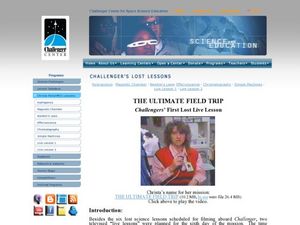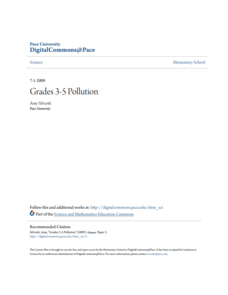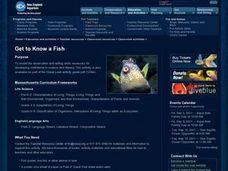Curated OER
Virtual Geologic Field Trip to Griffith Park
Students explore the geological processes and research methodology involved in the evolution and development of Griffith Park. They justify the selection of a geologic hypothesis based on observations.
Curated OER
Field Trip to the Watsonville Wetlands
Students explore the differences between food webs and food chains. In this wetland lesson students play a food web game and go on a scavenger hunt.
Curated OER
Going to the Farm
Students complete a variety of farm-related activities, culminating with a field trip to visit a local farm. They complete a class KWL chart, and write questions for an interview with a farmer. On the field trip students participate in a...
Curated OER
Oh! The Places I CAN See!
Students explore landmarks around the world. In this world geography and technology activity, students view world landmarks using a webcam. Students take a virtual field trip during which they zoom in and manipulate three dimensional...
Curated OER
Field Trip to Mammoth Cave
Students, when given a microscope or a camera, write two observations they have seen using technology that they did not see with just their eyes with 100% accuracy. When given a blank map, they mark the location of Mammoth Cave along...
Curated OER
Forest Succession
Learners research environmental change and why forests cannot stay the same for long. In this environmental growth lesson, students discuss the life cycle of a tree and examine tree cookies to discover the age of these specimens....
Curated OER
The Ultimate Field Trip
Students view a video to understand the set-up of the shuttle aircraft. In this shuttle lesson, students recognize the functions of parts of the space ship and why they are important. Students research the shuttle and present an oral...
Curated OER
Internet Field Trip: Simple Machines
Students research simple machines. In this physics lesson plan, students participate in a WebQuest to gain knowledge about simple machines. WebQuest activities and worksheets are included in this lesson plan.
Curated OER
Sand Shakes & Mud Pies: Investigating Sediment
Take a field trip to a location where water and land meet to study patterns of sediment organization in wet habitats: river or ocean beaches, sand dunes, tidal marshes, the edge of a pond, or a woodland stream. Small groups collect pairs...
Pace University
Pollution
Over the course of 10 days, scholars take a pre-assessment to place them in one of three leveled groups. Whole-class and in small groups, pupils take part in read-alouds, field trips, hands-on activities, and complete learning contracts...
Curated OER
Non-Point Source Pollution Program
Written as field trip preparation to Gateway National Recreation Area, this resource is also appropriate for any class that is studying the impact of human activity on the environment. During the first activity, learners identify...
Curated OER
Listening To The Prairie
Students investigate the concept of agriculture and how it is part of the ecology and economy of the United States. They participate in a number of different classroom activities intended to raise agricultural awareness. The activities...
Curated OER
MountainQuest!
Your scientists are employed by NASA! They have to evaluate five potential sites around the world and decide which location would serve the scientists best. There are comprehensive lesson plans for this electronic field trip, and your...
Curated OER
Litter Critters
Explore biology by conducting an organism search field trip! Young explorers discuss how litter impacts the environment and how some organisms find solace in the trash we leave behind. Several worksheets are included here.
Curated OER
Endangered Species Field Trip
Students use the internet to complete a virtual field trip on endangered species. They identify the causes of an animal becoming endangered or extinct. They practice using new vocabulary as well.
Curated OER
A Mini Insect Field Trip
Students practice the four skills they have already explored so far: collecting, labeling, pinning, and making field observations on insects and plants in the RHS Outdoor Science Classroom.
Curated OER
Red Tail Ridge Wetland Study Project
Fifth graders use a real life scenario of the wetlands to gather information on creatures of the habitat. For this wetlands lesson, 5th graders research the interdependence of organisms in a healthy habitat. Students collected...
Curated OER
Wild, Wild Wetland Wildlife
Students investigate biology by participating in a science experiment. In this dissection lesson, students conduct a nature field trip around their school grounds and identify animals, plants, tracks and waste. Students dissect an owl...
Curated OER
Get to Know a Fish
Learners discover the anatomy of a fish by identifying its body parts. In this oceanography lesson, students view a live fish in their classroom and draw a poster of the fish one body part at a time while identifying it....
Curated OER
The Marvels of Mud
Young scientists roll up their sleeves and get a little dirty in this three-day earth science investigation. Following the scientific method, children monitor the growth of algae in pond water samples in order to determine...
Curated OER
Investigate Pine Creek!
Young scholars are invited to become detectives in this Web-Integrated Science Environment (WISE) as they explore a local creek, its environment and ongoing status. Students participate in field trips, acquisition of data through water...
Curated OER
Nature Walk
Students participate in a mini field trip around the neighborhood to observe nature and changes that are occurring during fall. They collect leaves of various colors, shapes and sizes on their trip. Upon return to the classroom, they...
Curated OER
Marine Field Trip to Whytecliff Park
Pupils study the intertidal habitat, tidal pools and the organisms that live in them. In this aquatic ecosystems instructional activity students take a field trip and experience first hand the local seashore environment.
Curated OER
"A Typical Day at Seaworld" one day visit
Explore the business side of careers in zoological or marine parks. Learners use the internet, field trips, and their research skills to develop an understanding of what skills are needed to work in an animal park environment.























